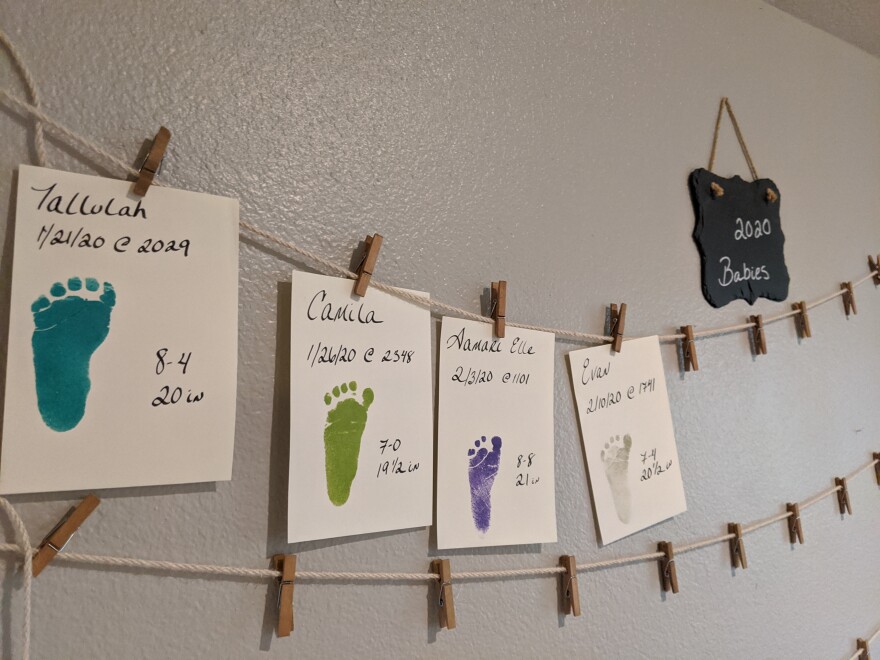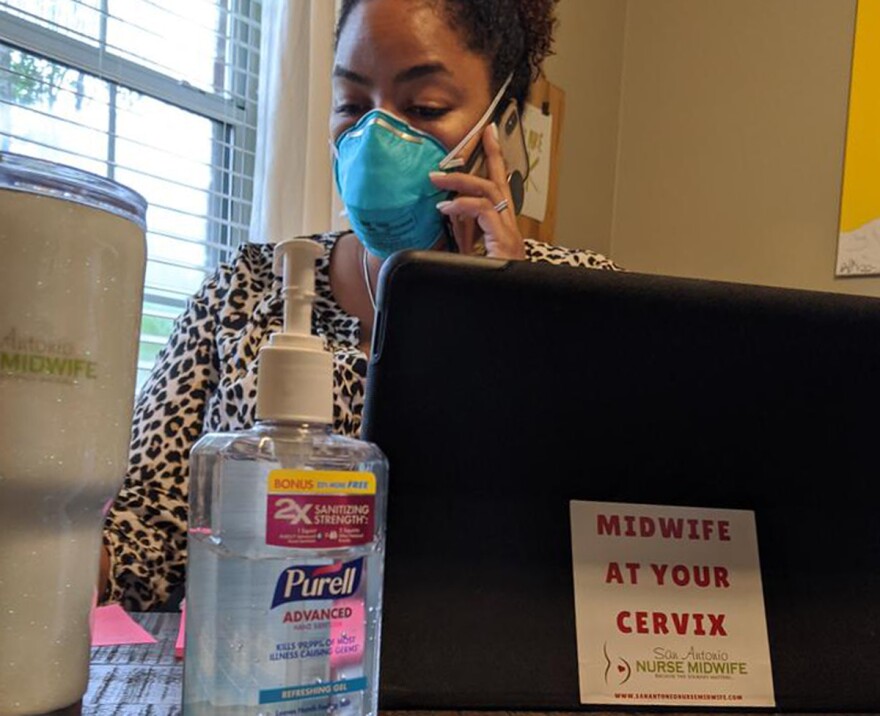New rules at hospitals around birthing aim to limit new moms’ exposure to COVID-19. Those rules combined with outright fear of the virus, have some pregnant moms looking for alternatives to the hospital.
Nikki McIver Brown’s phone has been ringing a lot more lately. The certified nurse midwife sits in an exam room. A sticker on her open laptop reads “Midwife at your cervix.”
“Here’s one here, she is calling about the coronavirus,” said Brown.
She plays a message from the recent call.
“I am four months pregnant and currently being seen at a doctor’s hospital who had an outbreak of corona, and is now closed. And i'm looking to transfer care to a home birth or birth center,” said the unnamed woman.
Brown owns San Antonio Nurse Midwife Birth Center in Garden Ridge, north of San Antonio. She said she’s getting double the 10 calls she usually gets a week. And the reason is coronavirus. Women concerned about the virus are looking at alternatives to the hospital.
“Probably about 70% are about COVID and 30% are about support people.”
Most are worried about hospitals exposing them to the disease while others don’t like new rules imposed to prevent the spread of it. They limit the number of people allowed at birth.
At many hospitals you could have multiple people. Many would have a partner and a birthing coach like a doula or a parent. In the past week many Texas hospitals have reduced to one "emotional support" person.
“So, it’s really causing a lot of them to become anxious and wrecking their plans,” Brown said.
Set among green fields, and foggy skies the feel of the home-turned-birthing center is about as far from what you would imagine an urban hospital could be. It has two birthing suites and Brown often does home births. She said she delivered 59 babies last year.

As we talked, a woman pulls up in her vehicle outside. Brown called her.
“I see you. I was gonna ask you questions while you were in the car. You ready?” asked Brown.
The physical check up will be face to face, but to limit exposure they started doing the check-in interview outside.
The woman coughed loudly.
“Tell me about that cough,” Brown said.
“I was just clearing my throat,” she said with some exasperation. “I haven’t been out of my house in two weeks.”
Brown laughed.
Despite the current pandemic most doctors stand by hospitals as the best place for births.
“We've got decades of data outside of COVID-19 say it is safer for women not to give birth at home,” said Dr. Kjersti Aagaard, Professor of obstetrics and gynecology at Baylor College of Medicine in Houston.
She admits there are still a lot of unknowns around the virus. Many women ask how COVID-19 could impact their pregnancy or birth, and she said doctors need to be upfront.
“We simply don't know. We wish we could tell everybody, ‘Don't worry about it, it'll be fine.’ But we don't know that yet,” she said.
At the time of her interview, less than three dozen pregnant women with COVID-19 were documented. The results are mixed. But historically, respiratory illnesses and pregnant women are a bad combination.
"We simply don't know. We wish we could tell everybody, don't worry about it, it'll be fine. But we don't know that yet"
All of Claudia Cuento’s female friends with kids told her how great it would be to give birth in the spring. You get a “built-in” heater over the winter and best of all you don’t have to worry about flu-season.
"Now flu season is looking like a trip to f———— Disneyland because this is just outrageous."
She lives in San Antonio and is 35 weeks pregnant. She plans on giving birth in the hospital but the pandemic is complicating things.
“If I get too stressed, it could, you know, activate labor And we're still four-and-a-half weeks away, said Cuento.
She self-quarantined the past 15 days and only ventured out for checkups.
Her plan had been to have her husband and her sister when she gave birth. Her hospital says her sister can’t be there.
“It's a little bit heartbreaking,” she said. “At this point, she won't even be able to see him until she's been away from people for 14 days.”
There is a chance hospitals further restrict who can be present for the birth. When asked what she would do if she had to birth with no emotional support people, she said she didn’t know. She leaned toward still going to the hospital.
Her husband Joey Cuento, a nurse, says if he has a vote it’s for the hospital.
“I know her answer is ‘maybe yes maybe no,’ but — for me — it would be a definite ‘yes’ because if there is anything that happens — any kind of emergency, she's already at a place where they can perform those types of things,” he said.
Hospitals in Texas are still keeping pace with cases of COVID-19, but if the so-called curve doesn’t flatten — and hospital beds become scarce — it’s not clear what that will mean for expectant moms.
Paul Flahive can be reached at Paul@tpr.org or on Twitter @paulflahive.


